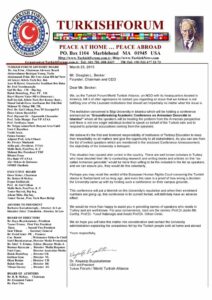Here is news that you don’t hear every day: a former Congressman stops working for a foreign client after not receiving his pay for a year!
This is exactly what happened to Cong. Dan Burton (Republican-Indiana) who quit last week as chairman of Azerbaijan America Alliance, a powerful Azeri propaganda outfit in the United States, after waiting a whole year to get paid.
What were his Azeri masters thinking? How could they cheat one of their agents in Washington? This is a good way to get your lobbyist turn against you!
Lobbyists promote a client’s interests, not because they support its cause, but to make money. Personal financial gain was the only reason why Cong. Burton was backing one of the world’s most repressive and corrupt governments. When the money stopped, there was no longer a reason for him to promote Pres. Aliyev’s dictatorial regime.
The Azerbaijan America Alliance was founded by tycoon Anar Mammadov, a 34-year-old billionaire playboy. Interestingly, Republican Presidential candidate Donald Trump had lent his name for a substantial fee to a luxurious hotel built by Mammadov’s company in Baku, Azerbaijan.
Reporter Carl Schreck and Radio Free Europe & Radio Liberty (RFE/RL) obtained a copy of the e-mail Cong. Burton sent on March 1, 2016 to James Fabiani whose Washington-based firm does lobbying work for the Azerbaijan America Alliance. “As I have not heard from you or Anar, and have not been paid for a year, please consider this e-mail as a letter of resignation as Chairman of the Azerbaijan America Alliance,” Cong. Burton wrote.
Here are further details from this scandalous affair disclosed by RFE/RL:
“Burton’s resignation follows months of speculation about the fate of the Azerbaijan America Alliance, a prominent pillar of a broader Azerbaijani lobbying campaign in the United States to portray Azerbaijan as a stable energy and security partner for the West. The lobby involves both private and state money.”
“Baku’s detractors accuse President Ilham Aliyev’s government and its proxies of trying to paper over an abysmal human rights record with ‘caviar diplomacy,’ using gifts, vacations, and other expensive incentives to gain friends and curry favor with foreign officials.”
“Aliyev recently removed broad powers from the Transport Ministry, overseen by Mammadov’s father, suggesting the family’s influence in the government is waning.”
“Several reports in the Azerbaijani media since August have cited unidentified sources as saying that Mammadov planned to shutter the Azerbaijan America Alliance due to financial difficulties amid the broader economic crisis Azerbaijan is grappling with due to plunging energy prices.”
“Over the past five years, the Azerbaijan America Alliance has poured a total of $12.3 million into U.S. lobbying efforts, according to the public-interest website Opensecrets.org, having wined and dined Washington’s elite and pushed Baku’s interests in meetings with senior members of Congress.”
“The organization, which is not formally affiliated with the Azerbaijani state but has hewn closely to the Aliyev government’s line, has continued this spending, paying $1.46 million for U.S. lobbying services in 2015, most of which went to Fabiani & Company, according to public lobbying disclosures.”
“The group spent $430,000 for its 2012 dinner, which was attended by then-House of Representatives speaker John Boehner and 15 other members of Congress, including Burton, according to a 2013 filing under the U.S. Foreign Agents Registration Act (FARA).”
“Burton was named chairman of the Azerbaijan America Alliance in February 2013, a month after he left office after a 30-year career in Congress. He told RFE/RL this week that Fabiani introduced him to Mammadov, chairman of Garant Holding, a conglomerate with interests that include construction firms, hotels, and insurance companies.”
“Investigations by RFE/RL have previously revealed that Anar Mammadov’s business interests are tied to the ministry overseen by his father, Ziya Mammadov.”
“Burton said that he did not engage in lobbying during his time with the Azerbaijan America Alliance, but that he would occasionally invite members of Congress to ‘social functions’ staged by the group. He also published opinion articles supporting the Azerbaijani government.”
Last May, I ran into Cong. Burton in the lobby of a New York hotel. I complained to him about his ongoing efforts on behalf of Azerbaijan and his votes against resolutions on the Armenian Genocide during his tenure in Congress. He gave me his business card, asking me to contact him…. I did not, and have no plans to do so now that he is no longer working as a propagandist for Azerbaijan.



